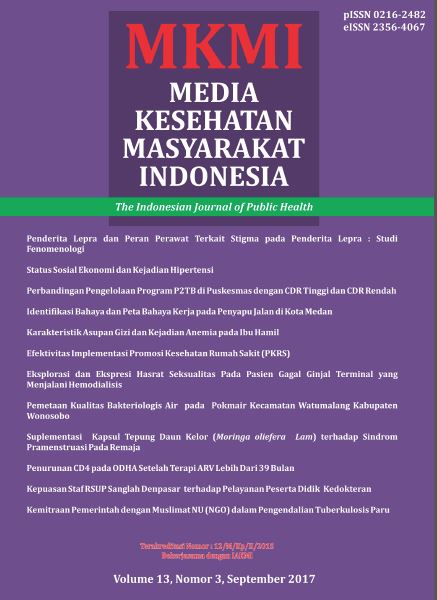PENDERITA LEPRA DAN PERAN PERAWAT TERKAIT STIGMA PADA PENDERITA LEPRA: STUDI FENOMENOLOGI
Abstract
Penderita lepra kerap mendapat stigma yang menyebabkan mereka ditolak di tengah masyarakat. Penelitian ini bertujuan menguraikan stigma yang dialami oleh penderita lepra dan usaha perawat dalam memberikan edukasi dan advokasi bagi penderita lepra terkait stigma yang mereka alami. Penelitian ini menggunakan metode penelitian kualitatif dengan pendekatan fenomenologi. Data diperoleh dengan melakukan wawancara mendalam terhadap tujuh perawat dan delapan pasien lepra di Rumah Sakit Donorojo, Jepara, Jawa Tengah. Empat tema yang diperoleh dari penderita lepra, yakni: 1) Respons pasien saat didiagnosis menderita lepra, 2) Sikap dan perlakuan yang dialami penderita lepra, 3) Respons terhadap stigma, dan 4) Pendapat pasien lepra terhadap pelayanan kesehatan. Empat tema yang diperoleh menurut pandangan perawat adalah: 1) Memberikan promosi kesehatan, 2) Mendukung pasien dengan lepra untuk kembali ke lingkungan masyarakat, 3) Meyakinkan masyarakat untuk menerima penderita lepra, dan 4) Memberikan informasi kepada masyarakat tentang penyakit lepra. Berdasarkan hasil penelitian, bentuk stigma yang paling sering dialami oleh pasien adalah penolakan dan pengasingan. Kesimpulan, untuk mengurangi stigma pada pasien lepra, dibutuhkan kerja sama antara perawat, pasien penderita lepra, masyarakat, dan pemerintah (tokoh masyarakat).
Full text article
References
World Health Organization. Global Leprosy Situation. Weekly Epidemiological Record. 2011;36(86):389-400.
Direktorat Jenderal Pengendalian Penyakit dan Penyehatan Lingkungan Departemen Kesehatan Republik Indonesia. Profil Pengendalian Penyakit dan Penyehatan Lingkungan. Jakarta: Depkes RI; 2012.
Dinas Kesehatan Provinsi Jawa Tengah. Buku Profil Kesehatan Provinsi Jawa Tengah. Semarang: Dinas Kesehatan Provinsi Jawa Tengah; 2012.
Garbin, C.A.S., Garbin, A.J.I., Carloni, M.E.O.G., Rovida, T.A.S., & Martins, R.J. The Stigma and Prejudice of Leprosy: Influence on the Human Condition. Revista da Sociedade Brasileira de Medicina Tropical. 2015;48(2):194-201.
Sermrittirong, S., Van Brakel, W.H., & Bunders-Aelen, J.F.G. Stigma in Leprosy: Manifestations, Effects and Dynamics. In: Stigma and Stigma Interventions Related to Leprosy and Tuberculosis in Thailand. The Netherlands: Ridderprint, Ridderkerk; 2014. pp. 57-70.
Mishra, C.P., & Gupta, W.K. Editorial: Leprosy and Stigma. Indian journal of preventive and social medicine. 2010;41(1):1-7.
De Groot, R., Van Brakel, W.H., & De Vries, H.J.C. Social Implications of Leprosy in The Netherlands-Stigma Among Ex-Leprosy Patients in a Non-Endemic Setting. Leprosy Review. 2011;82:168-177.
Masliah, T. Penemuan Dini Kusta pada Anak Sekolah Dasar. Jurnal Media Kesehatan Masyarakat Indonesia. 2014;10(4):205-210.
Sermrittirong, S., Van Brakel, W.H., Rodchan, S., Nuncho, S., & Bunders-Aelen, J.F.G. Assessing the Attitudes and Perceptions of Community Members and Health Workers Regarding Leprosy Stigma. International Journal of Tropical Disease and Health. 2015;5(1):11-24.
Dokumen Data Kunjungan Pasien. Jepara: RS Donorojo; 2010.
Dokumen Data Kunjungan Pasien. Jepara: RS Donorojo; 2011.
Polit, D.F., & Beck, C.T. Essentials of Nursing Research: Appraising Evidence for Nursing Practice. Philadelphia: Lippincot; 2010.
Staples J. Nuancing ‘Leprosy Stigma’ Through Etnographic Biography in South India. Leprosy Review. 2011;82:109-123.
Varkevisser, C. M., Lever, P., Alubo, O., Burathoki K., Idawani, C., Moreira, T. M.A., Phatrobas, P., Yulizar M. Gender and Leprosy: Case Studies in Indonesia, Nigeria, Nepal and Brazil. Leprosy Review. 2009;80:65-76.
Sermrittirong, S., & Van Brakel, W.H. Stigma in Leprosy: Concepts, Causes and Determinants. Leprosy Review. 2014;85:36-47.
Wang J., Pan, M., Zhang, G., Tan, Y., & Yan, L. Role of Community Youth Volunteers in Rehabilitation of People Affected by Leprosy: A Case Study from China. Leprosy review. 2010;81(4):346-347.
Authors
Authors retain copyright and grant the journal right of first publication with the work simultaneously licensed under a Creative Commons Atribusi-NonKomersial-BerbagiSerupa 4.0 Internasional License that allows others to share the work with an acknowledgement of the work's authorship and initial publication in this journal.
Copyright encompasses rights to reproduce and deliver the article in all form and media, including reprints, photographs, microfilms and any other similar reproductions, as well as translations. The reproduction of any part of this journal, its storage in databases and its transmission by any form or media, such as electronic, electrostatic and mechanical copies, photocopies, recordings, magnetic media, etc.
All articles published Open Access are free for everyone to read and download. Under the CC-BY-NC-SA license, authors retain ownership of the copyright for their article, but authors grant others permission to use the content of publications in Media Kesehatan Masyarakat Indonesia Universitas Hasanuddin in whole or in part provided that the original work is properly cited. Users (redistributors) of Media Kesehatan Masyarakat Indonesia Universitas Hasanuddin are required to cite the original source, including the author's names, Media Kesehatan Masyarakat Indonesia Universitas Hasanuddin as the initial source of publication, year of publication, and volume number.
Media Kesehatan Masyarakat Indonesia Universitas Hasanuddin is licensed under Creative Commons Atribusi-NonKomersial-BerbagiSerupa 4.0 Internasional.


